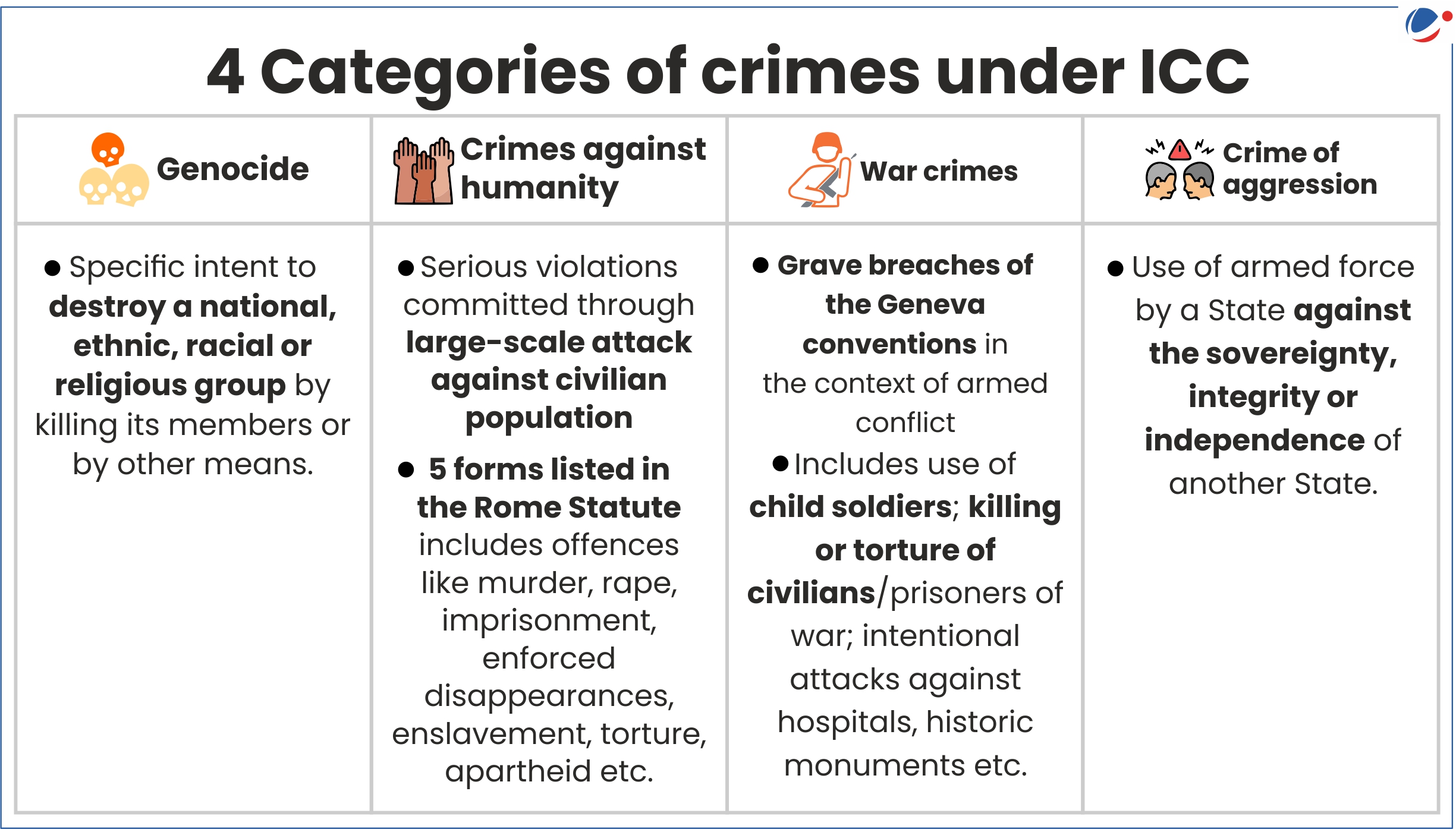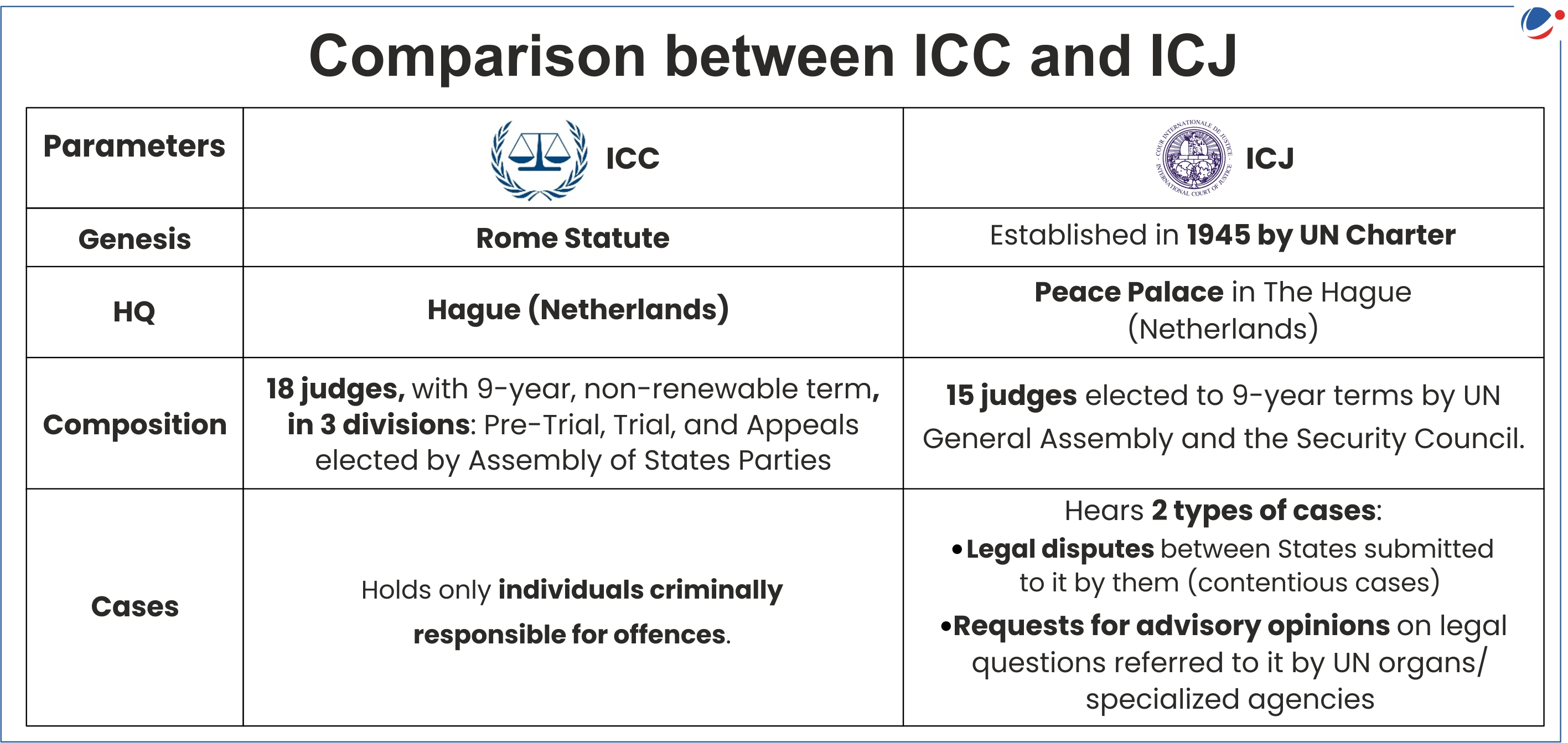Why in the news?
ICC prosecutor sought arrest warrants for Israel's Prime Minister and Hamas leaders for committing crimes against humanity and war crimes.
More about the news
- Earlier, in March 2023, ICC issued arrest warrant against Russian President in the context of situation in Ukraine.
- Consequences of the ICC issuing arrest warrants: The accused would be arrested and if not, would restrict their freedom of movement, as member states are obliged to arrest the accused.
About International Criminal Court (ICC)
- It is the first international permanent court to investigate and prosecute individuals accused of serious international crimes.
- ICC's founding treaty, called the Rome Statute (adopted in 1998 entered into force in 2002), grants the ICC jurisdiction over 4 main crimes (see infographic).
- Membership: 124 countries are States Parties to Rome Statute of ICC.
- India, Israel, the US, Russia and China are not parties to the Rome Statute.
- Palestine became the 123rd member (2015) and Malaysia became 124th State party (2019).
- Assembly of States Parties, with 1 representative from each party, is the Court's management oversight and legislative.
- Official languages: English, French, Arabic, Chinese, Russian and Spanish.
- Enforcement: ICC's decisions are binding.
- However, it does not have its own police force and relies on State cooperation, which is essential to the arrest and surrender of suspects.
- Additional Components
- Trust Fund for Victims (2004): Provides assistance, support, and reparations to victims.
- Detention Centre: Holds detainees in safe, secure, and humane custody.
- Complementarity Principle: The ICC complements national criminal systems and prosecutes only when states are unwilling or unable to do so genuinely.

Jurisdiction of ICC under the Rome Statute
- In case of Genocide, crimes against humanity or war crimes (committed on or after 1 July 2002) which are-
- Committed by a State Party national, or in territory of a State Party, or in a State that has accepted the jurisdiction of the Court.
- Referred to the ICC Prosecutor by the United Nations Security Council (UNSC) under chapter VII of the UN Charter.
- In case of Crimes of aggression:
- Crimes referred to the ICC Prosecutor by the UN Security Council, irrespective of whether it involves States Parties or non-States Parties.
- Prosecutor may also initiate an investigation on own initiative or upon request from a State Party.
- No jurisdiction with respect to any person under age of 18.
Limitations of the International Criminal Court (ICC) in Criminal Justice
- Lack of Enforcement Mechanism as it relies on cooperation with countries for arrests, transfers, asset freezes, and sentence enforcement.
- Further, Non-States Parties (such as Israel) have no obligation to cooperate with the Court on its requests for arrest and surrender.
- Some major countries are not parties to the ICC.
- Many State Parties are reluctant to cooperate with the Court's requests for arrest and surrender.
- So far, the ICC has issued 46 arrest warrants, with only 21 of them having been detained with the help of its member states.
- Insufficient Checks and Balances due to lack of effective oversight on the authority of the ICC prosecutor and judges.
- Lack of Retrospective Jurisdiction as ICC can only address crimes committed after 1st July 2002, when the Rome Statute came into force.
- Scarcity of human resources and funds, impacting its efficacy.
- Allegations of Bias with ICC being criticized as a tool of Western imperialism and biased against weak states, especially Africa.
Why did India not join the Rome Statute?
|
Conclusion
For effective functioning of ICC all States Parties should put in place effective national frameworks to cooperate fully with the ICC. There should be Concrete arrest strategies required to arrest the suspects. Also, ICC member states should focus on electing highly qualified judges with knowledge and experience in criminal law and procedure.






